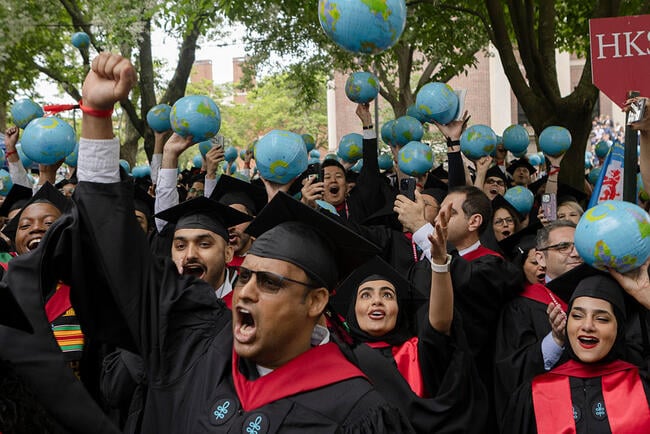You have /5 articles left.
Sign up for a free account or log in.

Harvard Kennedy School commencement in May 2025. More than half of the college’s students are international.
Libby O’Neill/Getty Images
The Harvard Kennedy School announced a contingency plan for its international students Tuesday in the event that the Trump administration successfully bars the university from enrolling foreign students, according to The Boston Globe.
The Kennedy School, Harvard’s postgraduate college of government, public policy and international affairs, said that both incoming and returning students could study remotely, and returning students would be given the option to finish their degree at the University of Toronto’s Munk School of Global Affairs and Public Policy.
“We are announcing these contingency plans now to alleviate the uncertainty many students feel, but we will not officially launch these programs unless there is sufficient demand from students who are unable to come to the United States,” Kennedy School dean Jeremy Weinstein wrote in an email Tuesday.
Harvard needs the approval of its accreditor, the New England Commission of Higher Education, to allow students to complete their degrees online, and current students who want to study in Toronto would have to apply for a Canadian visa next month.
The Kennedy School is the first college at the university to release its formal contingency plan; others are working on developing their own. HKS is particularly vulnerable to a foreign student ban: 59 percent of its students are international, compared to 24 percent of Harvard’s total student population.
Harvard is currently suing the Trump administration over multiple attempts to ban its foreign student population, including by revoking the university's Student Exchange and Visitor Program certification and issuing an executive proclamation. Last Friday, a federal judge granted Harvard a preliminary injunction in one of its court challenges.
Even if the Trump administration’s efforts targeting Harvard specifically are struck down by the courts, other moves—such as revoking Chinese students’ visas en masse or banning nonimmigrant visa holders from a dozen countries—could prevent some of the Kennedy School’s current and incoming students from attending.





